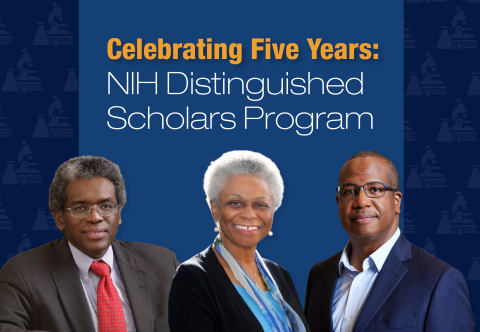
Pictured left to right: Roland Owens, Ph.D., Marie A. Bernard, M.D., and Neil Hanchard, M.B.B.S, D.Phil. Credit: NIH
In our office, we say that great minds think differently.
It’s a given—and a must—for progress.
So, it’s not surprising that a program to increase the number of principal investigators committed to diversity, equity, inclusion, and accessibility (DEIA) in the NIH Intramural Research Program (IRP) was created by several offices at NIH.
The Office of Intramural Research (OIR) and my predecessor in the office of the Chief Officer for Scientific Workforce Diversity (COSWD) initiated the NIH Distinguished Scholars Program.
Since its establishment in 2018, we’ve seen an increase in the diversity of tenure track scientists, including women and individuals from racial and ethnic groups underrepresented in the sciences. The program is not only supported by all of NIH, it is meeting its goal of supporting the development of tenured scholars.
As the program celebrates five years and 65 scholars, we reached out to one of the program’s pioneers and its first tenured scholar to learn more about the program’s founding and future.
Excellence First
Establishing the NIH Distinguished Scholars Program required an intentional approach.
“There are some people concerned that increasing diversity lowers quality,” said Roland Owens, Ph.D., Acting Principal Deputy Director of the NIH Office of Intramural Research and Director of Research Workforce Development and one of the creators of the program.
To address this concern and to be consistent with the OIR’s principles of inclusive excellence, candidates must be selected from a national principal investigator search.
The hiring institute or center then nominates the candidate, with final selections made by the Deputy Director for Intramural Research, in consultation with the COSWD and an advisory committee of IRP leaders.
Helping Others
Investigators attracted to the program tend to expend substantial time and energy on DEIA activities, explains Dr. Owens. “They're helping people in places where nobody else looks, giving health talks at churches, and more. These aren’t activities that promote their careers.”
To help “level the playing field,” Dr. Owens said that the program provides the scholars with small group mentoring with senior intramural researchers and networking with NIH leadership.
Better Problem Solvers and Broad Implications
The NIH Distinguished Scholars Program is a diverse and inclusive group, which is reflected in their decision making. “We, and others, found that diverse problem solvers, if managed properly, can solve complex problems better than homogeneous groups of problem solvers who tend to have the same blind spots,” said Dr. Owens.
This translates into management skills. “People who can manage ethnically, racially, and gender diverse teams also have the ability to manage interdisciplinary teams.”
Dr. Owens foresees broad implications for public health. “Groups underrepresented in the biomedical research workforce are overrepresented in preventable disease burden,” he said. “If you look at deaths related to COVID, cancer, and diabetes, it's like a mirror image of the people who we have as principal investigators.”
He hypothesizes that “exposure to biomedical research careers is in and of itself a public health intervention, so hiring health researchers who can create opportunities for diverse groups of people should impact public health. That’s the long-term goal.”
Forward Looking
When Neil Hanchard, M.B.B.S., D.Phil., first heard about the NIH Distinguished Scholars Program, he was a member of the Diversity Equity and Inclusion Task Force of the American Society of Human Genetics.
“I was struck that it was such a forward-looking initiative—particularly at that time—designed to support and celebrate outstanding researchers from underrepresented groups, but, unlike similar initiatives, not imposing on their time or efforts beyond that,” he said.
He eagerly applied. “I have found it to be exactly as advertised and then some—highly collegial and extremely supportive at all levels, but keenly mindful that our primary role at the NIH is as scientific investigators.”
Dr. Hanchard is a senior investigator in the Center for Precision Health Research and head of the Childhood Complex Disease Genomics Section within the Intramural Research Program of the NIH National Human Genome Research Institute. He runs a program that uses human genetics and genomics to better understand conditions such as malnutrition, hypertension, and sickle cell disease in diverse populations. He also works with an international group to study the genomics and environmental contributors of diseases in African populations.
As the first of two tenured scientists in the program, Dr. Hanchard said, “It’s incredibly humbling—all of the DSP scholars are equally deserving and doing incredibly cutting edge, high-quality work, but I’m happy to go first to pave the way.”
We’re glad, too. As Dr. Owens said, “I’m totally inspired by this program. Our intention is to have large enough cohorts that they create a self-reinforcing community and help drive culture change.”
Continuing Excellence
Through the Distinguished Scholars Program, we are seeing a significant increase in the percentage of women and scientists from underrepresented groups in the NIH tenure-track program. The changes have been sufficiently impressive that NIH invested in an extramural replication of the DSP, the Faculty Institutional Recruitment for Sustainable Transformation (FIRST) initiative.
It is my pleasure to co-lead FIRST with my colleagues, the directors of NCI, NIMHD, NINDS, and NHLBI. Once a third set of cohorts is announced for Fiscal Year 2023, we will have at least 15 cohorts supporting approximately 150 early career faculty at academic and research institutions across the country.
We will see, over the next many years, whether FIRST has the same excellent outcomes we are seeing with the DSP. I’m optimistic.

